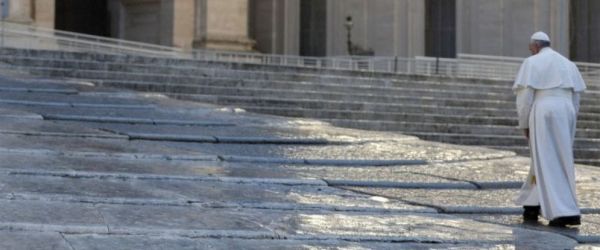"How do I follow Jesus?" This is the simple question every Christian should ask themselves in order to understand whether their faith is authentic and sincere, or in some way "self-serving." The risk, in fact, is that of watering down one's adherence to Christ with calculations of convenience. Pope Francis emphasised this in his homily during Mass celebrated on the morning of Monday, 16 April, at Santa Marta. Commenting on the liturgy of the word, the Pontiff identified two possible paths that lie before every baptised person: that of the protomartyr Stephen, who, "full of grace and the Holy Spirit," acted "without weighing the consequences" of his choices, and that of the crowd that allowed itself to be won over by miracles.
There are, therefore, Francis explained, "different ways, different manners of following Jesus." The people described in John's Gospel (6:22-29), who had just witnessed the miracle of the multiplication of the loaves, followed Jesus not only "because they were hungry for the word of God and felt that Jesus touched their hearts, warmed their hearts," but also "because Jesus performed miracles; they also followed him to be healed, to gain a new vision of life." So much so that, the Pope recalled, in another passage of the same evangelist (4:48), Jesus rebukes them: "You, unless you see miracles, you do not believe." As if to emphasise that "miracles are not important; what is important is the word of God, it is faith." Therefore, Jesus "praises the people who approach him with faith." In fact, "to the father who asked for his son's healing," he said, "Everything is possible for those who believe."
So the people who "followed Jesus to hear him" after the multiplication of the loaves even wanted to "make him king." Therefore, he went away "alone to pray." Summarising the Gospel story, the Pope described what happened, with the people seeking the Lord and finding him the next day on the other side of the lake. Why this insistent search? To listen to Jesus, but above all "out of interest." In fact, the Lord's rebuke comes immediately: "Truly, truly, I say to you, you are seeking me, not because you saw signs, but because you ate your fill of the loaves." Francis entered into the psychology of the crowd: "good people" who want "to hear the word of Jesus and feel how that word touches their hearts," but who are also driven by interest. Theirs is therefore a faith that combines "two things: a faith, a desire to love Jesus, but also a little self-interest."
They are not the only ones in the Gospel to have this attitude. The Pontiff recalled, for example, the episode of the demoniac of Gerasa narrated by Luke (8:26-39), in which the herdsmen, when they saw that because of that miracle "they had lost their pigs," made "calculations and said: 'Yes, yes, this man is a miracle worker, but he is not good for us; we are losing money because of him,' and they told him politely, 'Go away, go back to your own place.'" Or we can think of the ten lepers mentioned again by Luke (17:11-19), who "were healed and went away, but only one returned to give thanks: the others had been healed and so they forgot Jesus."
Faced with a faith conditioned by self-interest, Jesus rebukes them and says, "Work not for the food that perishes, but for the food that endures for eternal life, which the Son of Man will give you." The food is the word of God and the love of God.
[Pope Francis, at St. Martha's, in L'Osservatore Romano, 17 April 2018]


